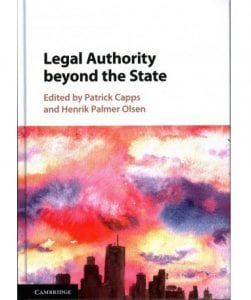By Prof Patrick Capps, Professor of International Law (University of Bristol Law School) and Prof Henrik Palmer Olsen (University of Copenhagen Faculty of Law)
 Two new edited volumes, which add new perspectives on international law, have recently been published by OUP and CUP. The first is International Court Authority (published by OUP during the summer of 2018 and edited by Karen Alter, Laurence Helfer and Mikael Rask Madsen), and the second is Legal Authority Beyond the State (published by CUP early in the spring of 2018 and is edited by Patrick Capps and Henrik Palmer Olsen (the writers of this blog)). The books are similar insofar as they present interdisciplinary scholarship on the authority of international law. Both are, at root, an exploration of how legal authority is established and evolves in international organizations, such as international courts. An important difference between the two books is how each sees the plausible limits of theoretical inquiry into the nature of authority. International Court Authority is more empirical, while Legal Authority Beyond the State is situated in the rationalist philosophical tradition. We argue that the empirical inquiry found in International Court Authority is limited to measure factual, observable behavior which appears to be engaging with international organizations and their laws, but it cannot account for authority per se, which is commonly accepted (in both books) to be the self-conscious orientation of actor’s behavior towards international law, so that it is consistent with the practical reasons offered by international organizations. (more…)
Two new edited volumes, which add new perspectives on international law, have recently been published by OUP and CUP. The first is International Court Authority (published by OUP during the summer of 2018 and edited by Karen Alter, Laurence Helfer and Mikael Rask Madsen), and the second is Legal Authority Beyond the State (published by CUP early in the spring of 2018 and is edited by Patrick Capps and Henrik Palmer Olsen (the writers of this blog)). The books are similar insofar as they present interdisciplinary scholarship on the authority of international law. Both are, at root, an exploration of how legal authority is established and evolves in international organizations, such as international courts. An important difference between the two books is how each sees the plausible limits of theoretical inquiry into the nature of authority. International Court Authority is more empirical, while Legal Authority Beyond the State is situated in the rationalist philosophical tradition. We argue that the empirical inquiry found in International Court Authority is limited to measure factual, observable behavior which appears to be engaging with international organizations and their laws, but it cannot account for authority per se, which is commonly accepted (in both books) to be the self-conscious orientation of actor’s behavior towards international law, so that it is consistent with the practical reasons offered by international organizations. (more…)

